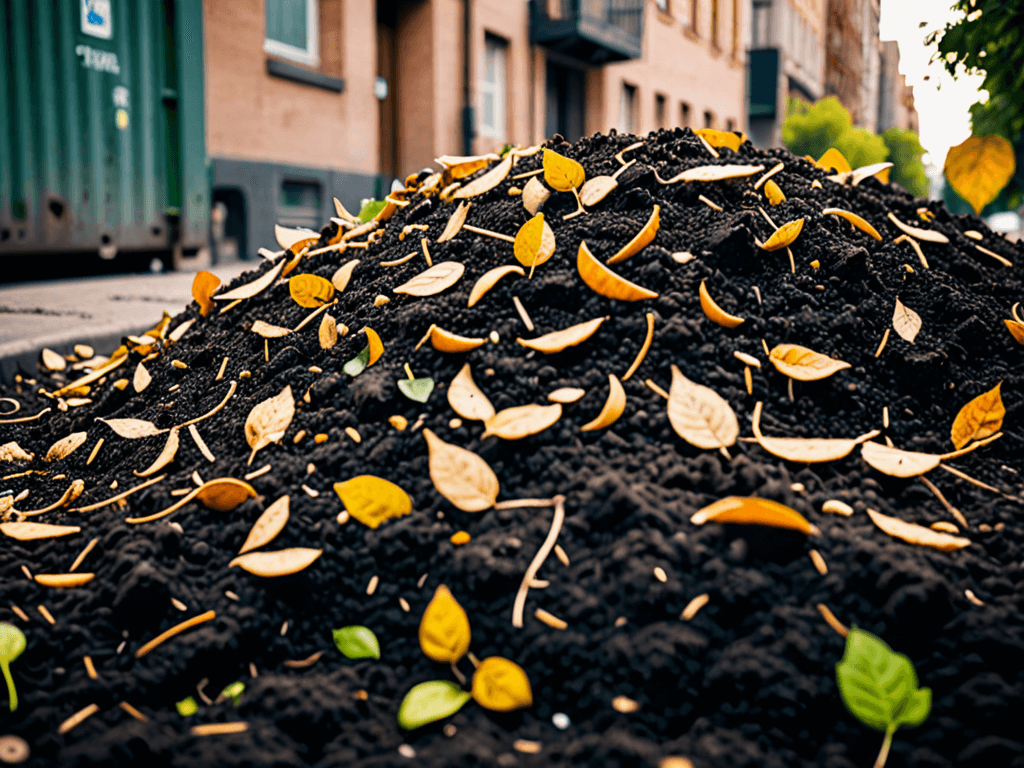Urban Composting is transforming the way cities manage waste by turning organic materials into nutrient-rich compost.
This practice not only reduces the burden on landfills but also enriches urban soil, making it vital for sustainable city living.
In this blog post, we will delve into the essentials of starting urban composting, its numerous benefits, and innovative solutions helping cities go green.
Join us as we explore how you can contribute to a more sustainable urban ecosystem.
Introduction to Urban Composting
Urban composting involves the systematic collection and decomposition of organic waste within city environments to create nutrient-rich compost.
This process allows urban residents to recycle food scraps and yard waste, transforming them into valuable resources for gardening or landscaping.
By engaging in urban composting, city dwellers help reduce the amount of waste going to landfills and cut down on methane emissions that contribute to climate change.
Furthermore, urban composting promotes sustainability by enhancing soil quality, which in turn supports local green spaces and urban agriculture.
Engaging the community in composting initiatives can foster environmental awareness and encourage collective action to combat urban waste challenges.
Start by setting up compost bins in accessible areas and educating neighbors on what can be composted.
Ensure proper maintenance to avoid odors and pests.
With a community-centric approach, urban composting can significantly benefit both individuals and the environment.
Benefits of Composting in Cities
Composting in cities offers numerous advantages, both environmental and economic. By converting organic waste into compost, urban areas can significantly reduce the volume of waste sent to landfills, lowering the costs of waste management and minimizing landfill emissions.
This practice also enriches impoverished urban soils, enhancing the growth of trees and plants in parks and community gardens. Healthy soil supports better water retention, reducing the need for excessive irrigation and promoting sustainable water use.
Implementing composting programs encourages community involvement, fostering a sense of responsibility and connection to the environment. Moreover, cities benefit from improved air quality as organic matter decomposes, leading to fewer greenhouse gas emissions.
In the long term, urban composting can lead to financial savings in waste management and contribute to pollution reduction efforts.
Getting Started with Urban Composting
To start urban composting, first choose a convenient location for your compost bin, like a balcony, backyard, or community garden.
Select a suitable compost bin that fits your space; options include tumblers, worm bins, or simple DIY models made from wooden pallets.
Begin by layering brown materials such as dry leaves and paper with green materials like kitchen scraps and grass clippings.
Make sure to maintain a good balance between these layers to promote efficient decomposition.
Keep the compost pile moist, similar to a damp sponge, but not too wet.
Regularly turn the pile to aerate it and speed up the composting process.
Avoid adding meat, dairy, and oily foods to prevent odor and pest issues.
Over time, you will produce rich compost to use in your garden or local green spaces, contributing to urban sustainability and reducing waste.
Best Practices for Urban Composting
Practicing urban composting can be highly rewarding when done correctly. Start by selecting the right spot for your compost bin, ensuring it is well-ventilated and easily accessible.
Choose materials carefully, balancing carbon-rich browns like leaves and shredded paper with nitrogen-rich greens like fruit scraps and coffee grounds. Consistency is key when adding materials; aim for a 3:1 ratio of browns to greens.
Regularly turn your compost to aerate it, and monitor the moisture level to keep it as damp as a wrung-out sponge. This helps microbes break down the waste efficiently.
Avoid composting materials that attract pests, such as meat or oily foods. Using a compost thermometer can help you keep track of the internal temperature and ensure optimal decomposition.
By following these best practices, you’ll create quality compost that nurtures urban landscapes and reduces waste.
Composting Bins and Tools for City Dwellers
Selecting the right tools and bins is crucial for effective urban composting. There are several types designed for city living that save space and minimize odor.
A popular choice is the countertop compost bin, which is compact and can be used to collect daily kitchen scraps.
For those with limited space, worm composting (or vermicomposting) bins are an efficient and eco-friendly option. These bins use worms to break down organic materials quickly and are ideal for apartments.
Compost tumblers, another urban option, are enclosed containers that make turning the compost easy and tidy, speeding up the decomposition process.
It’s important to use composting tools such as pitchforks, aerators, or specialized compost thermometers to maintain your bin and ensure a healthy composting environment.
Choosing the correct bins and tools not only makes composting manageable but also maximizes effectiveness in small urban spaces.
Common Challenges in Urban Composting
Urban composting comes with its own set of challenges, especially in densely populated areas. One major issue is space; limited space may restrict the size and type of composting a resident can pursue.
Odor management is another challenge, as improper maintenance can lead to unpleasant smells, disturbing neighbors. Dealing with pests is also critical; rodents and insects can be attracted to compost piles if not managed correctly.
It’s important to avoid composting materials like meats and dairy, which exacerbate these problems. Weather conditions, such as extreme cold or heat, impact decomposition rates, so keeping compost bins sheltered may be necessary.
Access to the right information and resources is vital for overcoming these issues, as beginners often find it challenging to understand the balance required for effective composting in an urban setting.
Encouraging community participation can help alleviate some of these difficulties, providing shared knowledge and support.
Innovative Urban Composting Solutions
Innovative urban composting solutions are helping cities transform waste into a valuable resource. One such solution is the use of community composting hubs, where residents can bring organic waste for collective processing, reducing the need for individual composting setups.
Additionally, technology-driven systems like smart compost bins, equipped with sensors to monitor moisture and temperature, optimize the decomposition process automatically.
Vertical or stackable composting units offer a space-saving option for those living in apartments.
Another exciting development is the integration of composting facilities with urban farms and gardens, promoting a cycle of growth and sustainability.
These innovations not only address common urban challenges but also encourage wider participation by making composting more accessible and efficient.
Future of Composting in Urban Areas
The future of composting in urban areas is poised to become an integral component of sustainable city living. As awareness about the importance of reducing carbon footprints grows, more cities are expected to adopt large-scale composting programs. Innovations like municipal composting services will offer convenient pickup and processing of organic waste, much like current recycling services. Additionally, educational initiatives aimed at both schools and communities will help spread best practices and ignite widespread participation. Advanced technologies, such as app-based tracking systems, could allow residents to monitor their composting contributions and understand the impact on their community. Urban planners are increasingly considering green infrastructure, including compost hubs, in new developments to promote sustainability. These developments indicate a shift toward a more environment-conscious urban landscape, where composting not only supports waste reduction but also fosters a culture of responsibility and resourcefulness.
Embracing Urban Composting for a Greener Tomorrow
Urban composting offers a practical solution for managing waste while enriching urban environments with nutrient-rich soil.
By participating in composting efforts, city residents play a pivotal role in reducing landfill reliance and minimizing greenhouse gas emissions.
As cities become more committed to sustainable practices, the adoption of community composting initiatives and innovative solutions becomes crucial.
These efforts help increase public engagement and foster collaborative approaches to environmental stewardship within urban areas.
With continued education and technological advancements, urban composting can transform city landscapes, making them healthier and more resilient for future generations.
Embracing this practice will not only enhance the quality of life in urban areas but will also contribute significantly to global environmental sustainability efforts.
FAQ – Common Questions About Urban Composting
What is urban composting?
Urban composting is the process of recycling organic materials within a city setting to create compost.
How does urban composting benefit cities?
It reduces landfill waste, lowers emissions, and improves soil quality for urban greenery.
What materials can be composted in urban settings?
Acceptable materials include fruit peels, vegetable scraps, coffee grounds, dry leaves, and shredded paper.
What type of compost bin is best for apartments?
Worm bins or small countertop composters are great for limited spaces like apartments.
How can I avoid odors in my compost bin?
Ensure a good balance of greens and browns, maintain moisture, and turn the compost regularly.
Are there any risks with urban composting?
If managed well, risks are minimal, but poor management can lead to odors and pests.


